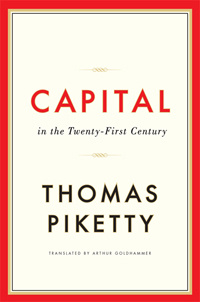Why everyone is talking about Thomas Piketty's Capital in the Twenty-First Century
The French economist's magnum opus explains the history of income inequality — and represents a real threat to the reign of the 1 percent


A free daily email with the biggest news stories of the day – and the best features from TheWeek.com
You are now subscribed
Your newsletter sign-up was successful
The English translation of French economist Thomas Piketty's magnum opus Capital in the Twenty-First Century is finally out, and it's made an enormous splash (see reviews here, here, and here). It's a brilliant, surprisingly readable work that synthesizes a staggering amount of careful research to make the case that income inequality is no accident. Indeed, Piketty argues that it is a feature of capitalism itself — unless governments take action to rein in capitalism's excesses.
That may sound like an obvious point to you. But the value of Piketty's work is that it shows that capitalism's postwar heyday — in which incomes at the bottom and the top actually converged — was a historical anomaly. Piketty's analysis of the last two centuries makes the case that capital in its natural state does not tend to spread out or trickle down, but to concentrate in the hands of a few.
This is news to those on the right who have long championed capitalism's egalitarian benefits. Conservatives have been far too complacent in believing that capitalism is the only possible economic system, and far too aggressive in attempting to demolish the structures that mitigate capitalism's worst side effects. If Piketty is correct, he has laid the intellectual groundwork for a resurgence of American socialism — and conservatives are starting to feel distinctly uneasy about it.
The Week
Escape your echo chamber. Get the facts behind the news, plus analysis from multiple perspectives.

Sign up for The Week's Free Newsletters
From our morning news briefing to a weekly Good News Newsletter, get the best of The Week delivered directly to your inbox.
From our morning news briefing to a weekly Good News Newsletter, get the best of The Week delivered directly to your inbox.
Jim Pethokoukis has the closest bead on this, with a red-baiting post worrying that a cultural conspiracy could result in the victory of "soft" Marxist statism:
Piketty thinks the German progenitor of Communism basically got it right...
[His] research is driving the economic agenda pushed by Washington Democrats and promoted by the mainstream media. The soft Marxism in Capital, if unchallenged, will spread among the clerisy and reshape the political economic landscape on which all future policy battles will be waged. We've seen this movie before.
John Maynard Keynes and Friedrich Hayek famously squared off in the 1930s, Left versus Right. But when Keynes published his revolutionary General Theory in 1936, Hayek went silent. It was a de facto retreat that helped give free rein to anti-market forces — even if that was not what Keynes intended — for decades until Milton Friedman and Anna Schwartz wrote A Monetary History of the United States in 1963 and energized the intellectual fight against statism. Who will make the intellectual case for economic freedom today? [National Review]
The biggest problem with this account is that Keynes was not a Marxist, nor much of a statist by any reasonable definition. He was a bourgeois economist whose life's work was dedicated to saving capitalism from itself, by solving the problem of recessions. He was on the side of conservatives when it came to maintaining the capitalist project. Markets are great, in Keynes' view, it's just the government must be ready with certain policies to prop up aggregate demand during recessions.

In the Keynesian view, the self-destructive tendencies of capitalism can be easily moderated with the right policies, something which Piketty also believes. Piketty's favorite policy is a progressive wealth tax, to lean against the natural tendency of capital to accumulate in ever-fewer hands. Indeed, his thesis might have been strengthened by a more explicit comparison between France, where sharp taxation on the rich and other policies have prevented a return to pre-World War I inequality, and America, where such policies have long since been smashed and inequality has returned to such levels.
Of course, no one has been doing more to prove Keynes and Piketty right than American conservatives, who have been eagerly demolishing these moderating structures. For at least the last 40 years, their policy orientation has been frankly aristocratic. When they get the chance, they sharply reduce taxes on inheritances and other unearned wealth much more than they do those on income. The bold new conservative innovation since the 2008 financial crisis has been to add social insurance, especially for the poor, to the list of things that need to be slashed.
A free daily email with the biggest news stories of the day – and the best features from TheWeek.com
That is why Piketty has made such a huge impact: He has starkly and convincingly outlined the stakes for future generations. Either we'll have a new birth of reformed capitalism, with his preferred progressive wealth tax and other institutions, or we'll have wealth concentration on such a colossal scale that it will threaten the democratic order.
Conservatives are just now waking to the danger they face from the fact that their beloved economic system is manifestly failing to share its benefits. That partly explains the hysterical reaction that greets people who aren't ashamed to wield overtly leftist slogans. These days, the ultra-rich are capturing nearly all (or more than all) the gains of economic growth, a rapidly shrinking middle class is treading water, and an increasingly huge minority is being left behind in poverty and desperation. Capitalism as we know it is responsible for those trends.
Ryan Cooper is a national correspondent at TheWeek.com. His work has appeared in the Washington Monthly, The New Republic, and the Washington Post.
-
 Political cartoons for February 15
Political cartoons for February 15Cartoons Sunday's political cartoons include political ventriloquism, Europe in the middle, and more
-
 The broken water companies failing England and Wales
The broken water companies failing England and WalesExplainer With rising bills, deteriorating river health and a lack of investment, regulators face an uphill battle to stabilise the industry
-
 A thrilling foodie city in northern Japan
A thrilling foodie city in northern JapanThe Week Recommends The food scene here is ‘unspoilt’ and ‘fun’
-
 The billionaires’ wealth tax: a catastrophe for California?
The billionaires’ wealth tax: a catastrophe for California?Talking Point Peter Thiel and Larry Page preparing to change state residency
-
 Bari Weiss’ ‘60 Minutes’ scandal is about more than one report
Bari Weiss’ ‘60 Minutes’ scandal is about more than one reportIN THE SPOTLIGHT By blocking an approved segment on a controversial prison holding US deportees in El Salvador, the editor-in-chief of CBS News has become the main story
-
 Has Zohran Mamdani shown the Democrats how to win again?
Has Zohran Mamdani shown the Democrats how to win again?Today’s Big Question New York City mayoral election touted as victory for left-wing populists but moderate centrist wins elsewhere present more complex path for Democratic Party
-
 Millions turn out for anti-Trump ‘No Kings’ rallies
Millions turn out for anti-Trump ‘No Kings’ ralliesSpeed Read An estimated 7 million people participated, 2 million more than at the first ‘No Kings’ protest in June
-
 Ghislaine Maxwell: angling for a Trump pardon
Ghislaine Maxwell: angling for a Trump pardonTalking Point Convicted sex trafficker's testimony could shed new light on president's links to Jeffrey Epstein
-
 The last words and final moments of 40 presidents
The last words and final moments of 40 presidentsThe Explainer Some are eloquent quotes worthy of the holders of the highest office in the nation, and others... aren't
-
 The JFK files: the truth at last?
The JFK files: the truth at last?In The Spotlight More than 64,000 previously classified documents relating the 1963 assassination of John F. Kennedy have been released by the Trump administration
-
 'Seriously, not literally': how should the world take Donald Trump?
'Seriously, not literally': how should the world take Donald Trump?Today's big question White House rhetoric and reality look likely to become increasingly blurred
